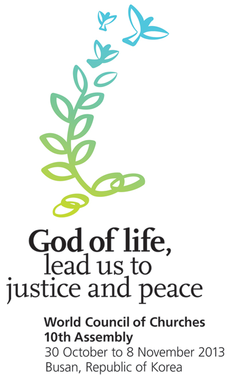WCC general secretary sees hope for the ecumenical movement
30 October 2013
Amidst dramatic events, injustices and crises in the world, God is creating a “new dawn” for the ecumenical movement, said the Rev. Dr Olav Fykse Tveit, general secretary of the World Council of Churches (WCC). He was reporting at the 10th Assembly of the WCC on the council’s work over the last seven years. He welcomed the coming of this Assembly which he expects to be an event of humility, honesty and hope.
Tveit addressed more than 2,000 participants in the WCC assembly on 30 October, the opening day of the 10-day assembly in Busan, Republic of Korea.
The assembly is focusing on the theme “God of life, lead us to justice and peace”.
Tveit introduced participants to WCC initiatives taken to strengthen the quest for Christian unity, Christian solidarity, promoting just peace, mission, advocacy in public witness and diakonia, ecumenical formation, fellowship of women and men, and spirituality of pilgrimage, among many other projects.
Tveit spoke about the WCC’s unique “added value”, which he said derives from “churches’ experience” contributing in diverse settings to the “understanding of human dignity, human rights, freedom of religion and peace”. He said that the WCC’s presence among other international organizations in Geneva also represents the WCC’s “added value” for church and society.
The WCC includes 345 member churches representing numerous Christian denominations and traditions around the world.
Christian solidarity and unity
In his address, Tveit expressed appreciation for the marked diversity of the WCC constituency. He said that churches have “gathered here from many places and cultures. With our diversity we bring stories, experiences, hopes, prayers and vision. We also bring our pain, our challenges, and our yearnings for justice and peace.”
Making a reference to solidarity with peoples and churches in conflict areas, Tveit said, “We are particularly called as a world community of Christians to be in solidarity” with those who live in the “lands where the history of our faith started and developed.”
“We think specifically of Iraq, Egypt, Syria and Palestine. With them, we believe that the way to peace is to move forward into a culture and practice of democracy and citizenship, with equal rights for all,” said Tveit.
“Christian solidarity cannot be exclusive,” he added.
Tveit also spoke about the assembly being held in Asia, which he called a “continent of growth”. He continued, “It is also a continent marked with many worries about protection of the life of human beings and nature, and many families who do not share the growth and hope of others.” He particularly addressed the situation of people in the divided Korean peninsula between the North and the South.
Since the last WCC assembly in Brazil, Tveit said, many challenges have been addressed. Yet, he added, “It is quite remarkable that, even with fewer resources and many challenges, these years have also been a time of rich harvest.
He concluded by inviting the assembly participants to “journey together” for “just peace” so that the “pilgrimage can begin”.
Read WCC general secretary’s report presented at the WCC assembly
More about the WCC 10th Assembly
High resolution photos available via photos.oikoumene.org





